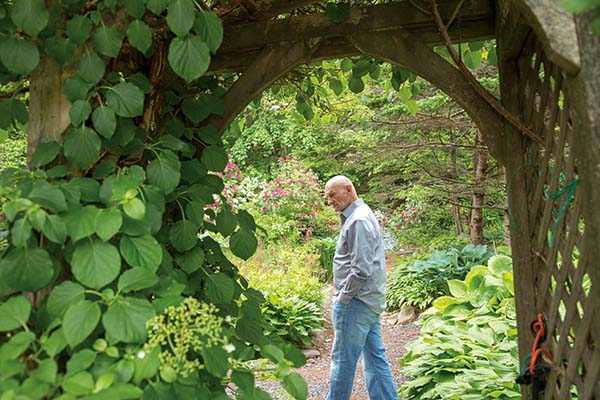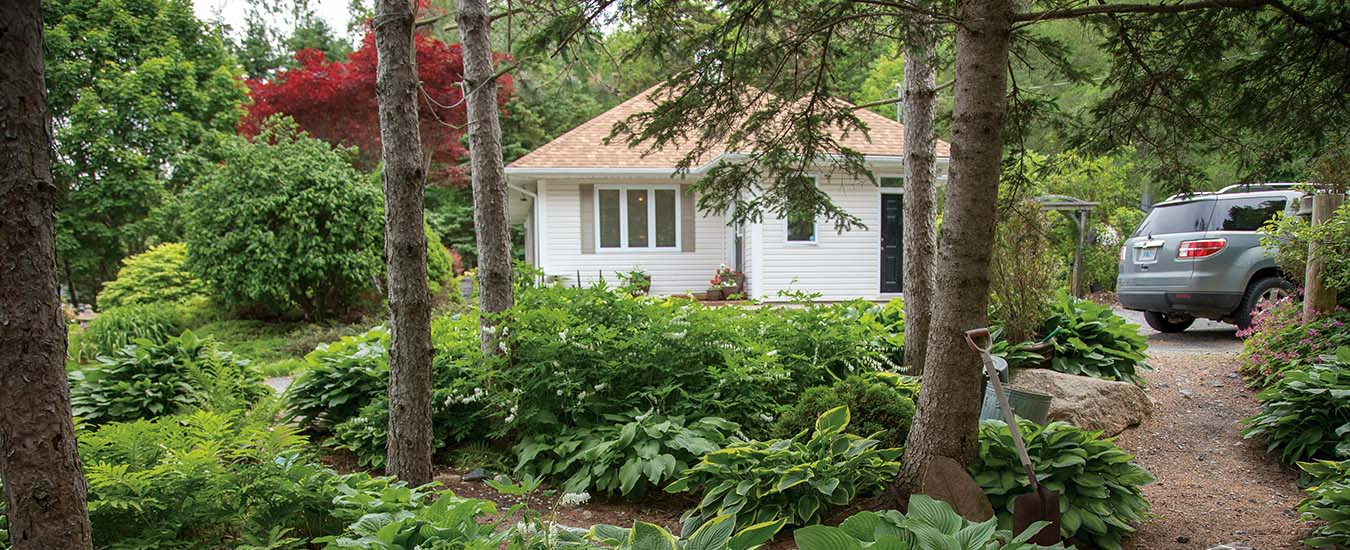Finding a life and home in St. Margaret’s Bay
by Gerry Barbor, as told to Philip Moscovitch
Gerry Barbor was born in Saskatchewan in 1938 and grew up in Vancouver, where he studied business at UBC. After graduating, he was hired by the Woolco chain of department stores as a store manager—a job that required him to move just about every year, as he was transferred from one town to another across the country. But once he and his wife, Candace, arrived in St. Margaret’s Bay, outside Halifax, they knew they were done moving. They bought an old house with a large 19th-century barn at the top of a hill, far back from the road, and built their lives here. Candace (who passed away in 2014) set about raising the kids, ran a B&B for a few years, and later flourished as an artist. Gerry plunged into life in the Bay, taking on all kinds of manual labour to survive, while slowly building an accounting and bookkeeping practice.
At the time they came, St. Margaret’s Bay was a quiet place, still far more rural than suburban. Gerry volunteered for countless organizations and helped out neighbours whenever he could—something he still does today.
Gerry is not one for nostalgia. Getting him to share his stories is not always easy, because he doesn’t like to look back. The same attitude that saw him take on jobs ranging from sealing to roofing, to managing local icon Barbara Jannasch’s retreat centre, Akala Point, keeps him seeking new experiences (he trekked to Machu Picchu last year) and always looking forward.
I came here in September 1972, after being transferred to Halifax. I lived in a hotel for three or four weeks until I found a place to rent in Hackett’s Cove. Then Candace drove out with her dad and I think I made some points with my father-in-law because he loved the place. As did I. We had tidewater in the front and back, we had a wharf, we had a fish house, lots of tourists on the front lawn painting the cove. I mean, it was just idyllic. We started a family and my interest in moving disappeared instantly.
We bought a house close by in Glen Margaret, and it was pretty much unlivable. It had one well, shared with a trailer next door, and one light bulb and one plug-in socket. In the winter, the snow would blow in one side and out the other. For insulation there was cardboard and newspapers. I remember there were little children’s rubber boots in one of the walls. They looked so strange there.
Candace decided the house would be OK and I assured her I’d have it all fixed up in six months. Me who’d never had a hammer in his hand before. Six months became 15 years, or something like that.
Not long before we came, the big change was central heat and the rural areas having electricity. So there was a lot of amazement about me buying a woodstove when people around here were trying to get out of wood heat. Candace’s parents came to visit over the holidays, and her mum slept beside the woodstove with her fur coat on. They cut their trip in half. They were not nearly as impressed as they were with the other place.
I was now unemployed, and I was going to do whatever it was going to take to survive.
I started off selling fish. I made a trailer and insulated it. I’d pick up fish all over the place—in Sambro and around here. Others just had mackerel, but I’d sell salmon and haddock or whatever. I’d sell to stores or go house to house, introduce my service and say I’d come whatever day they wanted and drop the fish off. It’s long hours and hard work, and there’s six months of the year when there’s no fish. So that’s not really very productive.
Then I got a job on the waterfront as a freight handler with the help of my neighbour, Dougie Morash. He was the kindest person I ever met. We unloaded cargo off the trains and the longshoremen would be putting it on the boats to go wherever it was going.
The freight handling was only part of the year too, so Dougie also worked on the [Angus L. Macdonald] bridge. He volunteered to get me a job there, painting the bridge.
“I thought it was a great opportunity”
Well, Candace was having nothing to do with that. Her husband was not going up painting the bridge. There were four or five people who would apply for every opening that there was. I went there every day for a month, and finally they got sick and tired of seeing me there and hired me. I told Candace I was painting the building.
I had a terrible fear of heights, so I thought it a great opportunity. Here’s another thing to conquer. Another challenge. We went out without safety belts or hard hats. Real men don’t wear those. Real men don’t wear earplugs—that’s why I can’t hear a thing now. There were things we did that were just stupid. I mean, we lost people. That all changed after Westray. What went on at Westray was exactly what went on with us. I’ve always had an interest in history, and in reading about Nova Scotia, one of the first things I read was about whale and seal hunting. It was very obvious that seal-hunting was much more here than a personal enterprise. It was a test of manhood.
I’ve always been a person who likes to test himself. There was a boat stationed here, at the old whale plant in Blandford. Dougie already had a spot and I signed on.
We got to the seal grounds and the fellow I’m bunking with says, “I’ve never worn underwear out on the ice. It’s too hot. Pair of overalls, and that’s it.” You worked so hard you produced enough heat, even at 30 below.
You go down over the sides of the boat on this rope ladder, and then when it’s time to jump you jump, and the boat keeps going. I’m kind of a little trepidatious, and everybody’s flying down the rope ladder, and by the time I get down to the ice, Dougie’s going over the horizon. That’s the way Dougie works at everything. He is the hardest-working person I’ve ever met.
At one point, the fisheries inspector comes along, and I think I’ve been through my fifth pair of gloves and I’m still skinning my first seal. My hands are just freezing! And I’ve never skinned a seal before. You’ve got so much fat to worry about and you can’t feel your fingers. He kind of watched me for a bit and then he shook his head and went away.
I would have been maybe 40. The old guys had better jobs and knew what they were doing. The young guys could outwork me, and anyways they grew up doing this kind of thing. They were tough. The captain wanted me to go back, but once was enough for me.
Pigs and goats and ducks and…
Candace and I were both very interested in animals. Candace in dogs, cats, birds, and me more interested in farm animals. So our farming career started off.
We must have had the chickens, because I went to the feed store in Sackville, and there had been a truck crash with a load of pigs in it. The pigs all escaped, and, as I recall it, nobody sent anyone out to collect them and the feed store was kind of handing out pigs to anyone who would take one! So I took a pig. Then we got goats and we had ducks and I tried turkeys once and I’ll never have another turkey in my life again. They’re tough things to raise. On the weekend, the whole family—kids and animals—would go for a walk up the hill. People would meet us and shake their heads: Geez, what kind of nuts do we have here? The chickens didn’t come, but the goats, pigs, and horses—we had a team of ponies—and the steer would all head out for a walk.
I bought a bunch of day-old ducks and raised them to sell them for Christmas. There was a substantial number of German people here who were quite prepared to pay the premium price for ducks. And then Candace decided she wanted the down to make comforters, and then things went downhill. In order to keep the down, you can’t soak the feathers when you’re plucking them. I had advance orders, or I never would have done this in the first place. I got no sleep for three or four days while I was plucking the ducks, and it was mind-boggling. And they were delivered at the very last moment. It was not good.

But I must not have been a quick learner, because the following Christmas I decided to cut down 25 fir trees from the back 40, dragged them down the hill manually, loaded them onto the truck and headed to Halifax. The trees looked really good up on the hill with snow on them! Fifteen days later, I returned home with 19 of the trees, frostbite and no money.
Baseball helps break the ice
When we came, there were very, very few people from away here. I mean, there’s a lot now. I volunteered for everything, and one of those things was baseball. I’d always loved sports and I had three kids. Do I need to go further?
Fast-pitch had started here before I came along, and then it became bigger and stronger and better organized due to a lot of volunteers. Seabright had a team, and so did French Village, Tantallon, Boutilier’s Point, and Hubbards. It was a competitive community thing. So I volunteered, of course, and loved it.
I coached the team in Seabright and nobody had to pay, so everybody could be included. The Legion supplied some uniforms, balls, bats, and the field. Mr. Doubleday did a lot of the organizing and Wayne Christie provided umpires for every game. It would not have worked without them.
Wilson Boutilier—he was a terrific athlete in every sport you can think of—and I got together and organized a competitive provincial team, and we’d often be out raising money, because we had to travel across the province and stay in motels and stuff.
I still have parents who stay in touch with me from those days. I can go to the Sobeys and parents and people who played for me approach me and we wind up in an hour-long conversation. I think that attachment to the parents and the players was how Candace and I met the community. That’s what got us into the community.
A place to call home
Halifax has changed hugely. And the dockyard—you wouldn’t walk down there at night. Now it has a boardwalk that ranks with any. It’s clean, it’s nice, it’s very cosmopolitan, there’s a wide range of good eateries. It’s a far different city than it was when we came.
I really like the city. I’ve fallen in love with Halifax. You can walk almost anywhere in the city proper. I walked along the waterfront today. I love it. The attractions and eateries they’ve got there, I just find it exciting, it’s got life to it, the city has changed tremendously. As life out here has.
What you call home doesn’t easily change, and we have no family ties here. But this became home for Candace and me because of neighbours who became friends and embraced us over the last 47 years. It’s important to me to name these friends: Barbara and Frank Corning, Diane Sharples, Sandra and Gordon, Geraldine and Danny Boutilier, and certainly Barbara Jannasch. Thank you for welcoming us.
